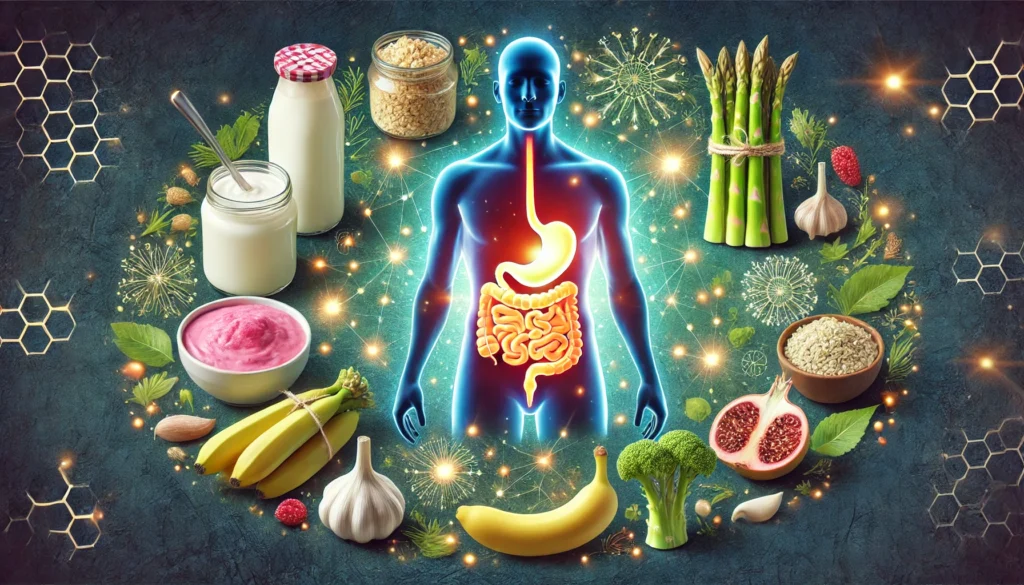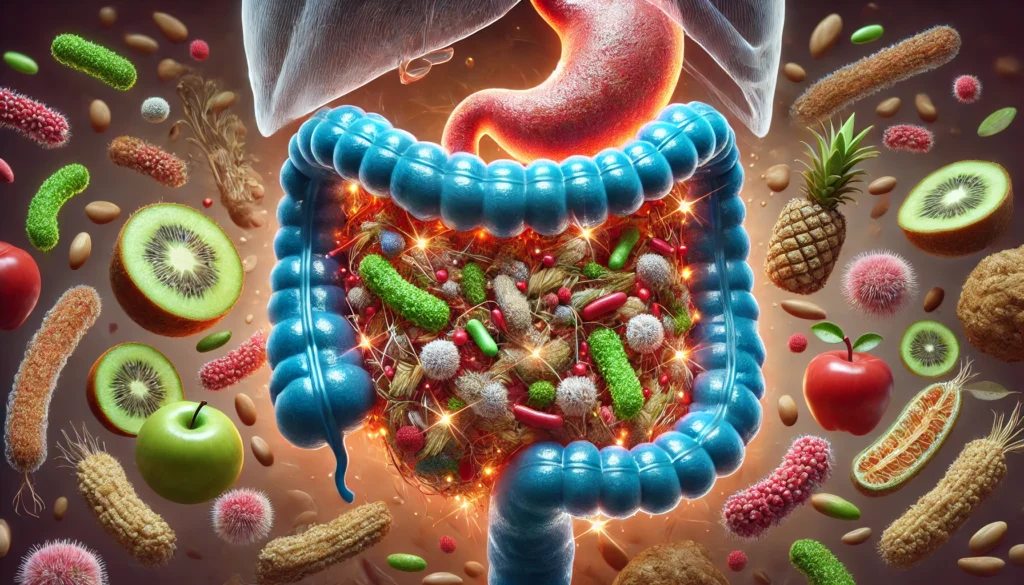Understanding the Importance of Gut Health
Gut health is a crucial aspect of overall well-being, influencing digestion, immunity, and even mental health. The human gastrointestinal tract is home to trillions of microorganisms, collectively known as the gut microbiome. These microbes play a vital role in breaking down food, synthesizing essential nutrients, and defending against harmful pathogens. However, factors such as poor diet, stress, antibiotics, and environmental toxins can disrupt this delicate ecosystem, leading to digestive disorders, weakened immunity, and systemic inflammation. Maintaining a balanced gut microbiome requires the right combination of prebiotics and probiotics, which work synergistically to support a healthy digestive system.
You may also like: How to Improve Gut Health Naturally: Science-Backed Tips for a Stronger Microbiome
The Science Behind Prebiotics and Probiotics
Probiotics are live beneficial bacteria that support gut health by replenishing and maintaining a balanced microbiome. Common probiotic strains include Lactobacillus, Bifidobacterium, and Saccharomyces boulardii, each offering unique benefits for digestive and immune function. Prebiotics, on the other hand, are non-digestible fibers that serve as food for probiotics, promoting their growth and activity. Found in foods like garlic, onions, bananas, and chicory root, prebiotics enhance the survival of beneficial bacteria, ensuring they thrive in the gut environment.
The best prebiotic and probiotic combination supports optimal digestion and immunity by fostering a symbiotic relationship between these two elements. By consuming prebiotics alongside probiotics, individuals can enhance the efficacy of their gut-friendly bacteria, leading to improved nutrient absorption, reduced inflammation, and better overall health.
Selecting the Best Prebiotic and Probiotic Combination
When choosing the best prebiotic and probiotic combination, several factors should be considered, including strain diversity, potency, and delivery method. Different probiotic strains offer distinct benefits; for example, Lactobacillus acidophilus helps break down lactose, while Bifidobacterium longum strengthens the intestinal barrier. Prebiotics such as inulin and fructooligosaccharides (FOS) provide the necessary nourishment for probiotics, enhancing their survival and function.
Pre and probiotic supplements come in various forms, including capsules, powders, and fermented foods. While some individuals prefer dietary sources like yogurt, kefir, and sauerkraut, others opt for high-quality supplements to ensure a consistent and effective dose. The best prebiotic supplement should contain diverse fiber sources to support multiple probiotic strains, while the probiotic component should have a high colony-forming unit (CFU) count to ensure viability.

The Role of Prebiotics and Probiotics in Digestion
A well-functioning digestive system relies on the presence of beneficial bacteria to break down food, synthesize vitamins, and regulate bowel movements. Probiotics help maintain the integrity of the gut lining, preventing harmful substances from entering the bloodstream and causing inflammation. Prebiotics enhance this process by stimulating the growth of beneficial bacteria, ensuring they outcompete harmful microbes that may disrupt digestive function.
Research suggests that pre and probiotic supplements can alleviate symptoms of common digestive disorders such as irritable bowel syndrome (IBS), bloating, and constipation. By restoring balance in the gut microbiome, these supplements can improve stool consistency, reduce gas production, and enhance overall gut motility. The best prebiotic and probiotic combination ensures that beneficial bacteria remain active and effective in promoting long-term digestive health.
Enhancing Immunity with Prebiotics and Probiotics
A significant portion of the immune system resides in the gut, making gut health essential for overall immune function. Probiotics stimulate the production of immune cells, such as macrophages and T-cells, which help the body fight infections. Prebiotics contribute by strengthening the gut barrier, preventing harmful pathogens from entering the bloodstream.
Regular consumption of pre and probiotic supplements has been linked to a lower risk of infections, including respiratory illnesses and gastrointestinal disturbances. The best prebiotic and probiotic combination supports the immune system by modulating inflammatory responses, reducing susceptibility to allergies, and enhancing the body’s ability to recover from infections.
Practical Tips for Incorporating Prebiotics and Probiotics into Your Diet
To maximize the benefits of pre and probiotic supplements, it is essential to adopt a gut-friendly diet that includes fiber-rich foods and fermented products. Incorporating foods such as yogurt, kimchi, miso, and whole grains can naturally boost gut bacteria populations. Additionally, consuming the best prebiotic supplement ensures adequate nourishment for probiotics, optimizing their function and longevity.
Hydration, stress management, and regular physical activity also play crucial roles in maintaining gut health. Drinking plenty of water helps facilitate digestion, while stress reduction techniques such as meditation and exercise promote a balanced gut-brain axis. By integrating these lifestyle practices with the best prebiotic and probiotic combination, individuals can achieve sustained improvements in digestion and immunity.

Frequently Asked Questions: Best Prebiotic and Probiotic Combination
1. What makes the best prebiotic and probiotic combination effective?
The best prebiotic and probiotic combination is effective when it supports the growth of beneficial gut bacteria while ensuring these bacteria remain active and functional. A high-quality combination will include well-researched probiotic strains such as Lactobacillus and Bifidobacterium, which help maintain digestive balance and immune health. At the same time, the best prebiotic supplement should contain fermentable fibers such as inulin, fructooligosaccharides (FOS), or galactooligosaccharides (GOS), which nourish probiotics and enhance their survival. One often overlooked factor is the need for probiotics to be protected from stomach acid, which is why delayed-release capsules or microencapsulation technology can improve their effectiveness. Additionally, a varied diet rich in fiber can complement supplementation, ensuring long-term gut microbiome stability.
2. How do pre and probiotic supplements impact mental health?
Emerging research suggests that pre and probiotic supplements can have a significant impact on mental health due to the gut-brain axis. Beneficial gut bacteria play a role in producing neurotransmitters such as serotonin and gamma-aminobutyric acid (GABA), which regulate mood and stress responses. The best prebiotic and probiotic combination can enhance gut flora diversity, leading to improved cognitive function and reduced symptoms of anxiety and depression. Some studies indicate that specific probiotic strains, like Lactobacillus rhamnosus and Bifidobacterium longum, may lower cortisol levels and promote emotional resilience. By fostering a balanced gut microbiome, prebiotics and probiotics can indirectly support mental well-being, making them a valuable component of holistic health strategies.
3. Can the best prebiotic supplement enhance athletic performance?
Yes, the best prebiotic supplement can enhance athletic performance by improving digestion, nutrient absorption, and reducing exercise-induced inflammation. Athletes require optimal gut function to process nutrients efficiently, and prebiotics help beneficial bacteria thrive, leading to better metabolism and energy utilization. Some prebiotic fibers also contribute to increased short-chain fatty acid (SCFA) production, which fuels gut cells and supports overall endurance. Furthermore, by reducing gut permeability and inflammation, prebiotics may help athletes recover faster from intense workouts. Combining prebiotics with high-quality probiotics can further support immune function, preventing the common colds and gastrointestinal issues that often affect athletes under physical stress.
4. How long does it take for pre and probiotic supplements to show results?
The timeframe for experiencing benefits from pre and probiotic supplements varies depending on an individual’s gut health, diet, and lifestyle. Some people notice improvements in digestion, such as reduced bloating and regular bowel movements, within a few days to a week. However, for more systemic benefits like enhanced immunity or mental clarity, it may take four to eight weeks of consistent supplementation. The best prebiotic and probiotic combination works gradually to restore microbial balance, and long-term use is often necessary for sustained effects. Maintaining a diverse diet with fiber-rich foods and fermented products can accelerate the positive impact of supplementation, helping the gut microbiome adjust more effectively.
5. Are there any risks associated with taking pre and probiotic supplements?
While pre and probiotic supplements are generally safe for most individuals, some people may experience mild digestive discomfort, such as gas, bloating, or changes in stool consistency, during the initial stages of use. This is often a temporary effect as the gut microbiome adjusts to the introduction of new beneficial bacteria. Individuals with compromised immune systems or severe gastrointestinal conditions should consult a healthcare professional before taking pre and probiotic supplements. Additionally, choosing the best prebiotic supplement with a balance of soluble and insoluble fiber can prevent excessive fermentation, which may cause discomfort. Ensuring the probiotic supplement contains clinically tested strains and adequate colony-forming units (CFUs) further enhances safety and effectiveness.
6. How do environmental factors affect the effectiveness of probiotics?
Environmental factors such as diet, stress, antibiotic use, and exposure to toxins significantly impact the effectiveness of probiotics. A diet high in processed foods and sugar can promote the growth of harmful bacteria, counteracting the benefits of even the best prebiotic and probiotic combination. Stress influences gut health by altering microbial balance and increasing gut permeability, making probiotics less effective. Frequent antibiotic use can deplete both harmful and beneficial bacteria, leading to imbalances that require targeted probiotic restoration. Additionally, storage conditions matter—probiotic supplements should be kept in a cool, dry place or refrigerated if required to maintain their potency. Pairing probiotics with prebiotics ensures better bacterial survival and colonization in the gut.
7. Can children benefit from the best prebiotic and probiotic combination?
Yes, children can benefit significantly from the best prebiotic and probiotic combination, especially in terms of digestion, immunity, and cognitive development. A child’s gut microbiome is still developing, making it more susceptible to imbalances caused by diet, stress, or antibiotic treatments. Probiotics can help prevent common digestive issues such as constipation, diarrhea, and colic while strengthening immune defenses against infections. Prebiotics play a crucial role by fostering the growth of beneficial bacteria, ensuring a stable gut environment from an early age. Pediatric formulations of pre and probiotic supplements are available, but parents should consult a healthcare provider to determine the most appropriate strains and dosages for their child’s specific needs.
8. How do prebiotics and probiotics influence weight management?
Prebiotics and probiotics can support weight management by influencing metabolism, appetite regulation, and fat storage. Certain probiotic strains, such as Lactobacillus gasseri and Bifidobacterium breve, have been linked to reductions in body fat and waist circumference. The best prebiotic supplement can enhance this effect by increasing SCFA production, which helps regulate appetite and improve insulin sensitivity. Additionally, prebiotics contribute to better gut barrier function, reducing systemic inflammation that may contribute to weight gain. While pre and probiotic supplements alone are not a magic solution for weight loss, they play a complementary role in a balanced diet and healthy lifestyle.
9. What should you look for in a high-quality pre and probiotic supplement?
A high-quality pre and probiotic supplement should contain multiple scientifically studied strains that target different aspects of gut health. Probiotics should have a high CFU count, typically ranging from 10 billion to 50 billion per serving, ensuring sufficient bacterial viability. The best prebiotic supplement should include diverse fiber sources, such as chicory root, acacia fiber, and resistant starches, to support a broad spectrum of gut bacteria. Additionally, the supplement should be free from artificial additives, allergens, and unnecessary fillers to maximize purity and effectiveness. Opting for clinically tested formulations with third-party certification provides an extra layer of assurance regarding quality and efficacy.
10. Can prebiotics and probiotics help with food intolerances?
Prebiotics and probiotics may help manage food intolerances by improving gut barrier function and modulating immune responses. Probiotics can aid in breaking down lactose and other difficult-to-digest compounds, reducing symptoms associated with lactose intolerance and certain carbohydrate malabsorption issues. The best prebiotic and probiotic combination supports microbial diversity, which can enhance the gut’s ability to process and tolerate a wider range of foods over time. Some prebiotic fibers also contribute to mucosal healing, reducing inflammation caused by food sensitivities. While not a cure for food intolerances, incorporating pre and probiotic supplements into a personalized diet plan may help mitigate symptoms and improve digestive resilience.

Conclusion: The Path to Optimal Gut Health
Achieving a balanced gut microbiome requires a comprehensive approach that includes dietary modifications, supplementation, and lifestyle adjustments. The best prebiotic and probiotic combination supports digestion, strengthens immunity, and enhances overall well-being. By choosing high-quality pre and probiotic supplements and incorporating gut-friendly foods into daily routines, individuals can foster a thriving microbiome that promotes long-term health.
Understanding the intricate relationship between prebiotics and probiotics allows for informed decisions about gut health. Whether through natural food sources or supplements, maintaining a well-balanced gut microbiome can lead to improved digestion, enhanced immunity, and a greater sense of vitality. Investing in gut health today paves the way for better overall well-being in the future.
gut microbiome balance, digestive health support, beneficial gut bacteria, fermented foods for gut health, immune system boost, gut-brain connection, intestinal flora support, dietary fiber benefits, microbiome diversity, natural digestive remedies, probiotic-rich foods, prebiotic fiber sources, gut-friendly diet, digestive enzyme support, holistic gut health, gut inflammation reduction, gastrointestinal wellness, microbiota restoration, gut health and immunity, probiotic supplementation benefits
Further Reading
Role of Prebiotics In Developing Baby’s Immunity?
Probiotics, Prebiotics, and Phytogenic Substances for Optimizing Gut Health in Poultry
Unveiling the therapeutic symphony of probiotics, prebiotics, and postbiotics in gut-immune harmony
Disclaimer
The information contained in this article is provided for general informational purposes only and is not intended to serve as medical, legal, or professional advice. While Health11News strives to present accurate, up-to-date, and reliable content, no warranty or guarantee, expressed or implied, is made regarding the completeness, accuracy, or adequacy of the information provided. Readers are strongly advised to seek the guidance of a qualified healthcare provider or other relevant professionals before acting on any information contained in this article. Health11News, its authors, editors, and contributors expressly disclaim any liability for any damages, losses, or consequences arising directly or indirectly from the use, interpretation, or reliance on any information presented herein. The views and opinions expressed in this article are those of the author(s) and do not necessarily reflect the official policies or positions of Health11News.


